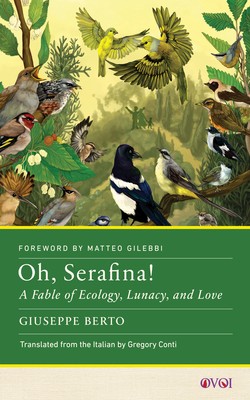
- We will send in 10–14 business days.
- Author: Giuseppe Berto
- Publisher: Rutgers University Press
- ISBN-10: 1978835744
- ISBN-13: 9781978835740
- Format: 12.9 x 20.5 x 1 cm, softcover
- Language: English
- SAVE -10% with code: EXTRA
Reviews
Description
Heir to the FIBA button factory in Lombardy, Augustus is profiting from Italy's postwar industrial boom. Yet the dreamy young man is far from your stereotypical industrialist. He is less interested in making money than in talking to the birds in the surrounding garden and in making love to a beautiful factory worker named Palmira. But when the money-hungry Palmira schemes to have him institutionalized, Augustus finds a new love among his fellow mental patients: flute-playing flower child Serafina. Can Augustus and Serafina find a way to break free and express their love of each other and of nature in this crazy world?
Newly translated into English, Giuseppe Berto's charming 1973 novel Oh, Serafina! was one of the first works of Italian literature to deal with ecological themes while also questioning the destructive effects of industrial capitalism, the many forms spirituality might take, and the ways our society defines madness. This translation includes a foreword from literary scholar Matteo Gilebbi that provides biographical, historical, and philosophical context for appreciating this whimsical fable of ecology, lunacy, and love.EXTRA 10 % discount with code: EXTRA
The promotion ends in 20d.18:24:11
The discount code is valid when purchasing from 10 €. Discounts do not stack.
- Author: Giuseppe Berto
- Publisher: Rutgers University Press
- ISBN-10: 1978835744
- ISBN-13: 9781978835740
- Format: 12.9 x 20.5 x 1 cm, softcover
- Language: English English
Heir to the FIBA button factory in Lombardy, Augustus is profiting from Italy's postwar industrial boom. Yet the dreamy young man is far from your stereotypical industrialist. He is less interested in making money than in talking to the birds in the surrounding garden and in making love to a beautiful factory worker named Palmira. But when the money-hungry Palmira schemes to have him institutionalized, Augustus finds a new love among his fellow mental patients: flute-playing flower child Serafina. Can Augustus and Serafina find a way to break free and express their love of each other and of nature in this crazy world?
Newly translated into English, Giuseppe Berto's charming 1973 novel Oh, Serafina! was one of the first works of Italian literature to deal with ecological themes while also questioning the destructive effects of industrial capitalism, the many forms spirituality might take, and the ways our society defines madness. This translation includes a foreword from literary scholar Matteo Gilebbi that provides biographical, historical, and philosophical context for appreciating this whimsical fable of ecology, lunacy, and love.

Reviews